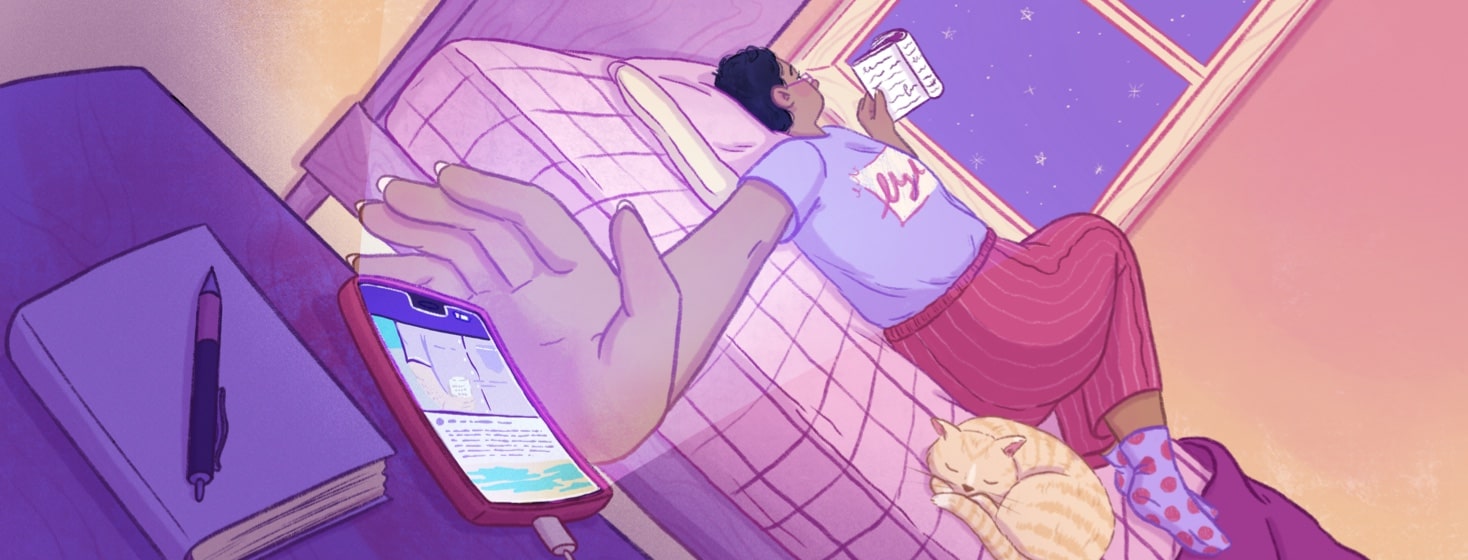What Is the Relationship Between Blue Light and Sleep?
In our modern, technology-driven world, screens are integral to our daily lives. Whether working on a computer, scrolling through social media on the phone, playing video games, or watching TV, we are constantly exposed to screens that emit a significant amount of blue light. While these devices bring convenience and entertainment, they might interfere with our sleep at night.1
What is blue light?
Blue light is a wavelength of visible light. Of all the wavelengths of light, it has the highest energy. Sunlight is the primary source of blue light. Exposure to blue light during the day helps keep our circadian rhythm in sync, helping us stay alert and have energy.1-4
How does blue light interfere with sleep?
Electronic devices like smartphones, tablets, and TVs emit a concentrated dose of blue light. LED and fluorescent bulbs – used more nowadays because of their energy efficiency – also emit more blue light than their older counterpart, the incandescent lightbulb.1-4
While this blue light is helpful in keeping us awake during the day, our sleep can suffer when we expose ourselves to artificial blue light during evening hours. This blue light tricks our brains into thinking it is still daytime. As a result, the brain suppresses the production of melatonin, a hormone that signals to the body that it is time to wind down and prepare for sleep. This makes it more difficult to fall asleep.1-4
Not only that but blue light can also disrupt the overall quality of sleep. This is particularly concerning for folks already dealing with sleep challenges like insomnia.1-5
Poor sleep has been linked with a number of health issues, including:1-3
- Poor cognitive function (ability to think)
- Weakened immune system
- Increased risk of chronic (long-term) health conditions like diabetes, obesity, and heart disease
Featured Forum
View all responsesBlue light solutions to improve sleep
Thankfully, there are practical steps you can take to defend against the effects of blue light and interrupted sleep:
Night mode and blue light filters
Many devices now come with a "night mode" or a blue light filter feature. Using this setting, especially as evening approaches, can reduce the amount of blue light emitted by your screen. You can also consider switching your phone from full color to gray scale so it is less appealing to scroll and be on your phone late into the night.1,2
Use blue-blocking glasses
If you are having trouble sleeping, try wearing blue light-blocking glasses in the evenings. These glasses are designed to filter out some of the blue light that comes from screens.1,2,4,5
Several studies have found that wearing amber-tinted glasses before bed helped improve the sleep of people with insomnia and other sleep disorders. The amber glasses prevented the blue light from blocking melatonin production. This allowed study participants to have better, high-quality sleep. While these findings are encouraging, experts say that more research is needed.4,5
This or That
Have you tried blue light blocking glasses?
Use red light for nightlights
Consider swapping your blue-light nightlights for dimmer red lights. Red light does not have as much effect on circadian rhythms.1,3
Limit screen time before bed
When it comes to blue light exposure, this is the most effective way to improve sleep. Give yourself at least 30 minutes to 1 hour of screen-free time before going to bed. Use this time to do some relaxing activities like:1-3
- Taking a warm bath
- Reading a print book
- Practicing meditation
- Listening to calming music
Improve your sleep hygiene
In addition to managing blue light exposure, adopting good habits can help you sleep more and better. Here are some tips that can help:3,6
- Maintain a consistent sleep schedule – Try going to bed and waking up at the same time each day. This can help retrain your body’s internal clock.
- Stay active during the day – Regular physical activity can help you get better sleep. Aim for at least 30 minutes of moderate exercise most days of the week.
- Dim the lights at night – When the sun sets, make an effort to dim the lights inside your home. This could mean turning off or dimming overhead lights and using lamps instead.
- Watch your eating habits – Avoid heavy meals and alcohol close to bedtime. These things can disrupt sleep.
- Create a relaxing bedtime routine – Start a presleep ritual that is all about calming and relaxing your body and mind. Do some light stretching, read a book, anything that is calming to the body and mind. And stay away from the screens.
- Keep your bedroom cool and dark – Ideally, for the best sleep, you want your bedroom to be a comfortable temperature and completely dark. Use blackout curtains to completely block light from getting in.

Join the conversation